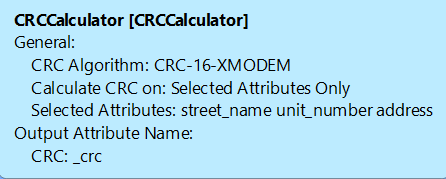I have two sets of address data that I'm trying to match up using the CRCDetector as described here https://community.safe.com/s/article/creating-a-unique-identifier-crccalculator.
Geometry isn't a concern so there are only the 3 fields to match up but I'm getting different CRC values for things that should be the same.
 Some of the algorithms will give a handful of matches but no more that a couple of dozen (out of about 12,000).
Some of the algorithms will give a handful of matches but no more that a couple of dozen (out of about 12,000).
I've checked for trailing white spaces. What else is making it think these things are different?
Thanks









